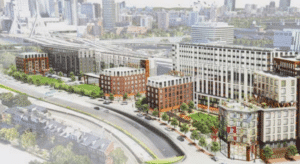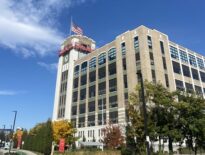
Trinity Financial's proposed develoment for the Austin Street parking lots includes 686 apartments and condominiums in four buildings ranging from 70 to 150 feet tall. Image courtesy of ICON Architecture
Boston-based Trinity Financial is the recommended pick for a $495 million development at a Charlestown property that is the first major test of Mayor Michelle Wu’s program to turn underutilized municipal real estate into affordable housing.
The project would include 686 apartments and condominiums in four buildings ranging from 70 to 150 feet tall, with the tallest structures bordering the upper deck of Interstate 93. Developers will reserve 60 percent of the total units as income-restricted.
In 2022, Wu announced that the 5-acre Austin Street parking lots were identified in a city-wide audit as one of several municipally-owned “high-impact sites” with potential to deliver large-scale affordable housing developments.
A committee of neighborhood residents and BPDA staff have recommended the agency’s board of directors select Trinity Financial as the preferred developer at its monthly meeting today. The second submission, a partnership of DREAM Collaborative and OnyxGroup Development, proposed 635 apartments and 122 condos in six buildings.
Trinity Financial is offering $100 to acquire the property from the BPDA. The firm estimates that it will contribute $60.2 million in equity and require a $267 million construction loan, according to a BPDA memo.
In its request for proposals, the BPDA indicated it will make subsidies available to make the project financially feasible. Developers also plan to seek state affordable housing subsidies and low-income tax credits.
The proposal includes 392 apartments, including 246 affordable units for households earning 30 to 70 percent of area median income. The 166 affordable condos would be available for households earning 80 to 100 percent of AMI, with the remaining 128 offered at market rate.
The parcels consist of parking lots used by Bunker Hill Community College at the northern end of the Rutherford Avenue corridor, where the BPDA recently approved a rezoning plan calling for higher-density, non-industrial uses.
Critics including District 1 City Councilor Gabriela Coletta and the Charlestown Preservation Society objected to the plan, which clears the way for millions of square feet of projects such as offices, labs and housing, warning that it will intensify traffic congestion.
Even before the rezoning, development has been ramping up in the neighborhood.
New England Development is proposing 500 housing units on a portion of the nearby Bunker Hill Mall property.
And in September, the BPDA approved Newton-based developer Fulcrum Global Investors’ One Mystic project, which will replace an industrial parcel with a 22-story, 503-unit apartment tower.
Transportation projects designed to serve Rutherford Avenue and surrounding communities include the MBTA’s Orange Line capacity upgrades, reconstruction of the Gilmore Bridge and reconstruction of Rutherford Avenue to accommodate a high-frequency bus lane.
But critics say the timing and funding of the projects remains unclear, and city officials shouldn’t encourage more development until there’s progress on improving the transportation networks.
In 2019, a pair of state agencies formed the Lower Mystic Regional Working Group to study the transportation question in Charlestown and neighboring communities.
The panel hasn’t met since 2019, according to Charlestown Preservation Society Preservation Society President Amanda Zettel, despite increased traffic from the opening of the Encore casino in Everett that year, and rapid commercial and residential development in Somerville and Everett.
“We really feel duped,” Zettel said in a recent interview. “We were promised and given assurances that planning would happen before development. The planning process was supposed to be community-led and all of that has changed.”




 |
| 



